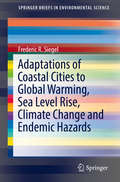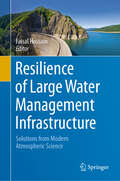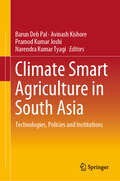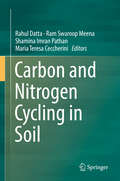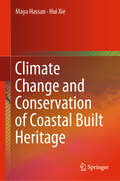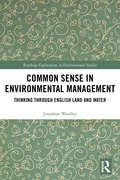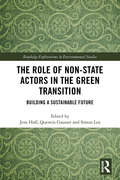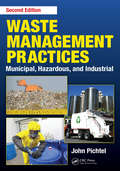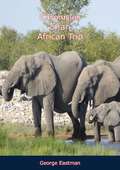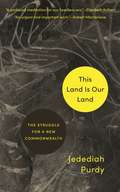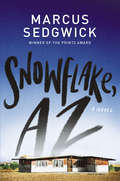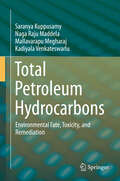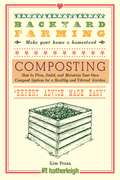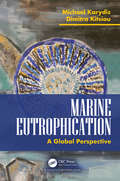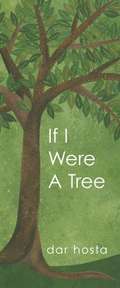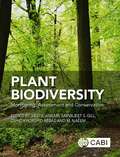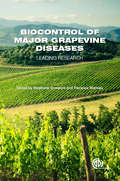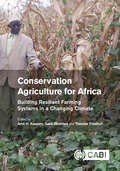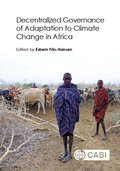- Table View
- List View
Adaptations of Coastal Cities to Global Warming, Sea Level Rise, Climate Change and Endemic Hazards (SpringerBriefs in Environmental Science)
by Frederic R. SiegelThis book discusses the identification of, solutions to, and management of threats to high population coastal cities and their seaports from global warming, climate change and endemic hazards. These include prevention of sea water intrusion of freshwater coastal aquifers, emplacement of barriers that mitigate the threats from sea level rise, and inundation of urban centers plus those from storm surges that cause flooding and salination of inshore terrain. The book assesses mitigation of the effects of extreme weather events such as drought, and major flooding from heavy rainfall on coastal urban centers, or on associated drainage basins. It also considers how coastal cities can counter vulnerabilities from other physical hazards (e.g., earthquakes - building codes) and health hazards (e.g., pollution, public health response - preparedness) that may be related to a city’s geological/geographical location and service as a port of entry for goods and travelers (regional and international). The book also cites the high costs of safeguarding citizen and municipal assets, but notes possible sources of potential funding especially from less developed and developing nations. The book is written to give strong background information to students majoring in environmental sciences or those in other majors with interests in the effects of global warming/climate change, and will be of interest to social scientists, think tank personnel, government planners, and lay persons in environmentally oriented organizations.
Resilience of Large Water Management Infrastructure: Solutions from Modern Atmospheric Science
by Faisal HossainInfrastructure that manages our water resources (such as, dams and reservoirs, irrigation systems, channels, navigation waterways, water and wastewater treatment facilities, storm drainage systems, urban water distribution and sanitation systems), are critical to all sectors of an economy. Realizing the importance of water infrastructures, efforts have already begun on understanding the sustainability and resilience of such systems under changing conditions expected in the future. The goal of this collected work is to raise awareness among civil engineers of the various implications of landscape change and non-climate drivers on the resilience of water management infrastructure. It identifies the knowledge gaps and then provides effective and complementary approaches to assimilate knowledge discovery on local (mesoscale)-to-regional landscape drivers to improve practices on design, operations and preservation of large water infrastructure systems.
Climate Smart Agriculture in South Asia: Technologies, Policies and Institutions
by Barun Deb Pal Avinash Kishore Pramod Kumar Joshi Narendra Kumar TyagiThis book discusses various climate smart agro-technologies, their technical and economic feasibility across heterogeneous agro-climatic conditions, assessing farmers’ willingness to adopt those technologies, impact of climate smart technology in agricultural production and possible policy and investment opportunities to upscale it. Containing eight chapters, the book starts with a discussion about the methodological aspects of priority setting of the farm technologies across various regions of South Asia including Eastern Indo-Gangetic plain, Western Indo-Gangetic Plain and arid regions. Using data from field based trials and expert solicitations, the book next deliberates on a list of feasible technologies, assessed by constructing climate smart Feasibility Index. Further on, there is an analysis, using stated preference method, of the behaviour of farmers in adopting climate smart technologies. Preference of women farmers has been given a special focus in this book. After discussing the method priority setting of the farm technologies, impact of climate smart technologies has been analysed using real time data. Government policies have been reviewed with the view of achieving climate smart agriculture in South Asia. The book also describes the optimization modelling framework for investment allocation and technology prioritization. The model integrates both the bio-physical and the economic optimization model to capture the agro-climatic heterogeneity within the region and the variability of technical feasibility across regions and crops. Results of this model will help policy makers to identify how much to invest, where to invest and what technologies to prioritize for investments.
Carbon and Nitrogen Cycling in Soil
by Ram Swaroop Meena Rahul Datta Shamina Imran Pathan Maria Teresa CeccheriniSeveral textbooks and edited volumes are currently available on general soil fertility but‚ to date‚ none have been dedicated to the study of “Sustainable Carbon and Nitrogen Cycling in Soil.” Yet this aspect is extremely important, considering the fact that the soil, as the ‘epidermis of the Earth’ (geodermis)‚ is a major component of the terrestrial biosphere. This book addresses virtually every aspect of C and N cycling, including: general concepts on the diversity of microorganisms and management practices for soil, the function of soil’s structure-function-ecosystem, the evolving role of C and N, cutting-edge methods used in soil microbial ecological studies, rhizosphere microflora, the role of organic matter (OM) in agricultural productivity, C and N transformation in soil, biological nitrogen fixation (BNF) and its genetics, plant-growth-promoting rhizobacteria (PGPRs), PGPRs and their role in sustainable agriculture, organic agriculture, etc. The book’s main objectives are: (1) to explain in detail the role of C and N cycling in sustaining agricultural productivity and its importance to sustainable soil management; (2) to show readers how to restore soil health with C and N; and (3) to help them understand the matching of C and N cycling rules from a climatic perspective.Given its scope, the book offers a valuable resource for educators, researchers, and policymakers, as well as undergraduate and graduate students of soil science, soil microbiology, agronomy, ecology, and the environmental sciences. Gathering cutting-edge contributions from internationally respected researchers, it offers authoritative content on a broad range of topics, which is supplemented by a wealth of data, tables, figures, and photographs. Moreover, it provides a roadmap for sustainable approaches to food and nutritional security, and to soil sustainability in agricultural systems, based on C and N cycling in soil systems.
Climate Change and Conservation of Coastal Built Heritage
by Maya Hassan Hui XieThis book presents the preservation principles and the current environmental challenges relating to monitoring heritage sites and buildings under the effects of climate change. It provides a clear overview of conservation action levels and the importance of participation and cooperation between them, and discusses evaluation and management methods, thermal comfort for the common usages, and conceptual methods for enhancing the built heritage. The research presented employed the “Zoom In, Zoom Out” approach for monitoring the Syrian coastal heritage sites threatened by the direct and indirect effects of climate change. Lastly, the book establishes the basic principles and conservation strategies for preserving the coastal heritage sites and buildings. As such, it is a valuable reference resource for researchers, developers, architects, and conservators involved in protecting the architectural heritage in coastal areas. It can also be used as a guidebook on preserving and monitoring built heritage sites at both macro and micro levels.
Common Sense in Environmental Management: Thinking Through English Land and Water (Routledge Explorations in Environmental Studies)
by Jonathan WoolleyCommon Sense in Environmental Management examines common sense not in theory, but in practice. Jonathan Woolley argues that common sense as a concept is rooted in English experiences of landscape and land management and examines it ethnographically - unveiling common sense as key to understanding how British nature and public life are transforming in the present day. Common sense encourages English people to tacitly assume that the management of land and other resources should organically converge on a consensus that yields self-evident, practical results. Furthermore, the English then tend to assume that their own position reflects that consensus. Other stakeholders are not seen as having legitimate but distinct expertise and interests – but are rather viewed as being stupid and/or immoral, for ignoring self-evident, pragmatic truths. Compromise is therefore less likely, and land management practices become entrenched and resistant to innovation and improvement. Through a detailed ethnographic study of the Norfolk Broads, this book explores how environmental policy and land management in rural areas could be more effective if a truly common sense was restored in the way we manage our shared environment. Using academic and lay deployments of common sense as a route into the political economy of rural environments, this book will be of great interest to scholars and students of socio-cultural anthropology, sociology, human geography, cultural studies, social history, and the environmental humanities.
The Role of Non-State Actors in the Green Transition: Building a Sustainable Future (Routledge Explorations in Environmental Studies)
by Jens Hoff Quentin Gausset Simon LexThis book argues that there is no way to make progress in building a sustainable future without extensive participation of non-state actors. The volume explores the contribution of non-state actors to a sustainable transition, starting with citizens and communities of different kinds and ending with cities and city-networks. The authors analyse social, cultural, political and economic drivers and barriers for this transition, from individual behaviour to structural restraints, and investigate interplay between the two. Through a series of wide-ranging case studies from the UK, Australia, Germany, Italy and Denmark, and a number of comparative case studies, the volume provides an empirically and theoretically robust argument that highlights the need to develop, widen and scale up collective action and community-based engagement if the transition to sustainability is to be successful. This book will be of great interest to students and scholars of climate change, sustainability and environmental policy.
Plants Feed Me (Into Reading Texas, Read Aloud Module 8 #1)
by Lizzy RockwellNIMAC-sourced textbook
Waste Management Practices: Municipal, Hazardous, and Industrial, Second Edition
by John PichtelWaste Management Practices: Municipal, Hazardous, and Industrial, Second Edition addresses the three main categories of wastes (hazardous, municipal, and "special" wastes) covered under federal regulation outlined in the Resource Conservation and Recovery Act (RCRA), an established framework for managing the generation, transportation, treat
The Secret World of Caves (Fountas & Pinnell LLI Gold #Level R)
by Will HurdAn underground wonderland. You might think caves are dark, damp, and frightening, but cavers all over the world know that caves are full of wonderful secrets and bizarre sights.
The Rock Garden (Fountas & Pinnell LLI Gold #Level P)
by Nancy WhiteStep into the Rock Garden of Chandigarh in India, it's like entering a magical world.
Chronicles of an African Trip
by George EastmanThis gripping book, which was first published in 1927, preserves a series of letters written by the author, George Eastman, founder of the Eastman Kodak Company. The letters chronicle Eastman’s adventures on a hunting trip into the interior of Africa that he made during the summer of 1926 with Daniel E. Pomeroy and Dr. Audley D. Stewart. The party departed New York for the African continent on March 13, 1926. Landing at Mombasa, they proceeded to Nairobi, where they established headquarters, making from there various long trips into the hunting regions of the interior. Stewart and Eastman returned to Rochester on October 24, 1926.During this trip, Eastman also met Martin and Osa Johnson, the American adventurers and documentary filmmaker couple that captured the public’s imagination through their films and books of adventure in exotic, faraway lands in the first half of the 20th century. The couple were on a four-year expedition to track the lion across Kenyan veld to his lair, footage of which was later used to make their 1928 black-and-white silent documentary film, Simba: The King of the Beasts.Beautifully illustrated throughout with photographs taken on the trip.
This Land Is Our Land: The Struggle for a New Commonwealth
by Jedediah PurdyFrom one of our finest writers and leading environmental thinkers, a powerful book about how the land we share divides us—and how it could unite usToday, we are at a turning point as we face ecological and political crises that are rooted in conflicts over the land itself. But these problems can be solved if we draw on elements of our tradition that move us toward a new commonwealth—a community founded on the well-being of all people and the natural world. In this brief, powerful, timely, and hopeful book, Jedediah Purdy, one of our finest writers and leading environmental thinkers, explores how we might begin to heal our fractured and contentious relationship with the land and with each other.From the coalfields of Appalachia and the tobacco fields of the Carolinas to the public lands of the West, Purdy shows how the land has always united and divided Americans, holding us in common projects and fates but also separating us into insiders and outsiders, owners and dependents, workers and bosses. Expropriated from Native Americans and transformed by slave labor, the same land that represents a history of racism and exploitation could, in the face of environmental catastrophe, bind us together in relationships of reciprocity and mutual responsibility.This may seem idealistic in our polarized time, but we are at a historical fork in the road, and if we do not make efforts now to move toward a commonwealth, Purdy warns, environmental and political pressures will create harsher and crueler conflicts—between citizens, between countries, and between humans and the rest of the world.
Snowflake, AZ
by Marcus SedgwickFrom Printz medalist Marcus Sedgwick, a gripping novel about health—our own and our planet’s—and the stigma of illness. Ash boards a Greyhound bus heading to the place where Bly was last seen: Snowflake, Arizona. Six thousand feet up in the wide red desert, Ash meets Mona, her dog, her goat, and her neighbors, and finds stepbrother Bly, too. In their ramshackle homes, the walls lined with tinfoil, almost all the residents of Snowflake are sick. But this isn’t any ordinary sickness: the chemicals and technologies of modern life are poisoning them. They call themselves canaries, living warning signs that humans have pushed the environment too far, except no one seems to be taking their warnings seriously. The healthy “normies” of Snowflake have written them off as a bunch of eccentrics, and when Ash too falls ill, the doctor’s response is “It’s all in your mind.” Snowflake, AZ contemplates illness and health—both our own and our planet’s. As Ash lives through a cycle of illness and recovery and loss, the world beyond is succumbing to its own affliction: a breakdown of civilization only distantly perceived by Ash and the isolated residents of Snowflake, from which there may or may not be a chance for recovery. This provocative novel by one of our most admired storytellers explores the resilience of love and community in the face of crisis.
Total Petroleum Hydrocarbons: Environmental Fate, Toxicity, and Remediation
by Naga Raju Maddela Kadiyala Venkateswarlu Saranya Kuppusamy Mallavarapu MegharajThe term “total petroleum hydrocarbons” (TPHs) is used for any mixture of several hundred hydrocarbons found in crude oil, and they represent the sum of volatile petroleum hydrocarbons and extractable petroleum hydrocarbons. The petrol-range organics include hydrocarbons from C6 to C10, while diesel-range organics are C10-C28 hydrocarbons. Environmental pollution by petroleum hydrocarbons is one of the major global concerns, particularly in oil-yielding countries. In fact, there are more than five million potentially contaminated areas worldwide that represent, in general, a lost economic opportunity and a threat to the health and well-being of humans and the environment. Petroleum-contaminated sites constitute almost one-third of the total sites polluted with chemicals around the globe. The land contamination caused by industrialization was recognized as early as the 1960s, but less than a tenth of potentially contaminated lands have been remediated due to the nature of the contamination, cost, technical impracticability, and insufficient land legislation and enforcement. This book is the first single source that provides comprehensive information on the different aspects of TPHs, such as sources and range of products, methods of analysis, fate and bioavailability, ecological implications including impact on human health, potential approaches for bioremediation such as risk-based remediation, and regulatory assessment procedures for TPH-contaminated sites. As such, it is a valuable resource for researchers, graduate students, technicians in the oil industry and remediation practitioners, as well as policy makers.
Backyard Farming: How to Plan, Build, and Maintain Your Own Compost System for a Healthy and Vibrant Garden (Backyard Farming #11)
by Kim PezzaYour Backyard Farming Experience Begins Here!Give Back to Your Garden by Composting!Backyard Farming: Composting is your all-in-one guide for creating your own homestead composting plan and adding rich, nourishing humus to your garden. This guide reviews every important topic from what should and should not be composted, benefits and uses for compost, how to build a compost bin, and much more.Whether you’re composting the waste from your farm or just the scraps from your kitchen, Composting is the comprehensive primer for anyone looking to start composting and bring that “black gold” to their own garden. Including detailed instructions and informative photographs that help ensure your compost system is practical and productive, Composting takes you step by step through everything you need to nourish your garden—and build healthy, rich soil.With Composting, you will:• Choose the composting method that works best for you, your needs, and your available material• Discover how to begin a compost system and how to maintain it for optimal yield• Construct your own composting system from a variety of easy-to-follow plans• Learn how to troubleshoot any problem your compost pile might develop• Find out how best to use your compost—including indoor container gardening...and much more to help you achieve success.More than ever, people everywhere are making a return to a self-sufficient, sustainable lifestyle. Join the growing movement of homemakers looking to a healthier, happier way of life—and it starts right in your very own backyard.Backyard Farming is a series of easy-to-use guides to help urban, suburban, and rural dwellers turn their homes into homesteads. Whether planning to grow food for the family or for sale at the local farmers market, Backyard Farming provides simple instruction and essential information in a convenient reference.
Marine Eutrophication: A Global Perspective
by Michael Karydis Dimitra KitsiouMarine eutrophication has been recognized as a global problem with adverse effects on ecosystem’s health and the economies of coastal states. Most conventions regarding marine environmental protection of Regional Seas have given priority to eutrophication and relevant management practices. This book presents a global perspective of eutrophication in most of the Regional Seas, including the legal framework, assessment and management practices. Information on ecosystem’s impact as well as an outline of the methods used for assessing eutrophication is also provided. This volume will be useful to research students, marine scientists and policy makers working in marine environmental management. Key Features: Contributes to the understanding of the eutrophication processes and problems Presents an extensive account of the data analysis methods used for the quantitative assessment of eutrophication Looks the eutrophication status of the main regional seas Provides information on eutrophication politics and measures to mitigate eutrophication
Places in My Community (Into Reading, Read Aloud #Module 3, Book 1)
by Bobbie KalmanNIMAC-sourced textbook
Amazing Plant Bodies: Tiny To Gigantic (Into Reading, Read Aloud Module 9 #3)
by Ellen LawrenceNIMAC-sourced textbook <P><P>Most plants have roots, stems, and leaves. Many grow flowers, seeds, and fruits. Some plants, however, have developed spectacular examples of these plant parts! From the longest roots in the world to the biggest seeds, this fact-filled volume looks at the biggest, smallest, weirdest, and most unusual plant parts in the world! Filled with information perfectly suited to the abilities and interests of an early elementary audience, this colorful, fact-filled volume gives readers a chance not only to learn, but also to develop their powers of observation and critical thinking. From fascinating images to high-interest facts, this book makes learning about plant bodies a lively and engaging experience. Amazing Plant Bodies: Tiny to Gigantic is part of Bearport's Plant-ology series. <P><P>Lexile Measure: IG590L
If I Were A Tree (Into Reading, Read Aloud Module 10 #1)
by Dar HostaNIMAC-sourced textbook <P><P>Tree Huggers everywhere will rejoice in this colorful and poetic celebration of the woody-stemmed wonders with whom we share our Earth. In this fourth picture book from Dar Hosta, trees are brought to life with vibrant color and cut paper collages. Gentle verse describes a variety of tree species in all seasons. Hosta pays homage to their importance in our day to day lives and encourages thoughtful readers to imagine how it would be to BE a tree. Includes tree fact page and a diagram of a tree's basic parts.
Plant Biodiversity: Monitoring, Assessment and Conservation
by Nishanta Rajakaruna Tarique Hassan Askary Mohammad Mobin Munir Ozturk Sanjeev Kumar Zahid Khorshid Abbas Subrata Trivedi Hasibur Rehman Anand Mohan Volkan Altay Shabir Ahmad Mir Mohammad Maqbool Mir Shalini Saggu Maria Amélia Martins-Loução Gisela Gaio-Oliveira Umar Iqbal Shafat Ahmad Banday Sheikh Mehraj Munib Ur Rehman Ghulam Hasan Rather Sunit Mitra Sobhan Kumar Mukherjee Kathryn E Barry Stefan A Schnitzer Salih Gucel Syed Baker K S Kavitha P. Azmath D Rakshith B P Harini S Satish Asma-Hammami Semmar Nabil Semmar Otília Correia Lia Ascensão Sulaiman Mohammad Al-Ghanim Fahad Mohammed Alzeibar Mudasir Irfan Dar Mohd Irfan Naikoo Fareed Ahmad Khan Farha Rehman Fouzia Nousheen H C Rao Martin T Dokulil Gopal Shukla Nazir A Pala Saikat Gantait Sumit Chakravarty Jyoti K Sharma Saiful Islam S M Sundarapandian K Subashree Pundarikakshudu Tetali Sujata Tetali Sankar K Ghosh Anjula Pandey K Pradheep K S Negi José Antonio González Ana Maria Carvalho Francisco Amich Uma Rani Sinniah Narayan Chandra Sahu Abir Sarraj Meg Trau Robin Owings Petros Ganatsas Disha Jaggi Mayank Varun Saurabh Pagare Niraj Tripathi Meenal Rathore Raghwendra Singh Bhumesh KumarResults of regular monitoring of the species diversity and structure of plant communities is used by conservation biologists to help understand impacts of perturbations caused by humans and other environmental factors on ecosystems worldwide. Changes in plant communities can, for example, be a reflection of increased levels of pollution, a response to long-term climate change, or the result of shifts in land-use practices by the human population. This book presents a series of essays on the application of plant biodiversity monitoring and assessment to help prevent species extinction, ecosystem collapse, and solve problems in biodiversity conservation. It has been written by a large international team of researchers and uses case studies and examples from all over the world, and from a broad range of terrestrial and aquatic ecosystems. The book is aimed at any graduate students and researchers with a strong interest in plant biodiversity monitoring and assessment, plant community ecology, biodiversity conservation, and the environmental impacts of human activities on ecosystems.
Biocontrol of Major Grapevine Diseases: Leading Research
by Florence Mathieu Stéphane CompantThis book provides a thorough research update on the very topical subject of biological control of grapevine diseases. It covers fungi, oomycete, bacteria and phytoplasma, and is particularly relevant to organic viticulture but also beneficial as part of IPM strategies for traditional production.
Conservation Agriculture for Africa: Building Resilient Farming Systems in a Changing Climate
by Dennis Dennis Peter Dorward Michael Misiko John A. Pickett J N Blignaut H Boulal Roland Bunch Trent W Bunderson Oussama El Gharras Mohammed El Mourid Mphatso Gama Zwide D Jere Josef Kienzle Jaap Knot Erna Kruger Peter Kuria Baqir Lalani Simon Lugandu Brand Mbale Charles Midega Zeyaur Khan Obedi Mkandawire Alice Murage Richard M. Museka Weldone Mutai Blessings M. Mwale Spencer W.D. Ng’oma John M. Paul Jimmy Pittchar Brian G. Sims Hendrik J. Smith Phillip Tembo Christian Thierfelder Patrick C. Wall Reynolds K. Shula Jose DambiroTillage agriculture has led to widespread soil and ecosystem degradation. This book reviews research and development initiatives in Africa aimed at building resilient farming systems. It summarises the status of conservation agriculture today, discusses prospects for future development and provides case studies showing its performance in Africa.
Dragon Walk: On Reef Recovery & Political Will
by Robert WintnerThe three main hubs of aquarium trade devastation are Indonesia, the Philippines, and Hawaii. Each has its own sad story of political corruption and theft of natural resources to benefit a greedy, ruthless few. Yet, despite facing a litany of challenges, each hub shows faint hope for progress: with Komodo National Park in Indonesia, a few bright lights in the development of Philippine reef management, and an anti-aquarium campaign taking hold in Hawaii. A beautiful coffee table photo book is one thing. Dragon Walk is a political grenade, willing to name culprits, political assassins, and nitwits with less spinal fortitude than most invertebrates. Dragon Walk is far more vital; a no-holds-barred grapple with evil and reef devastation that shines a light where others fear to tread.
Decentralized Governance of Adaptation to Climate Change in Africa
by Esbern Friis-Hansen Charles Aben Professor Jacob Agea Bernard Bashaasha Sarah Ann D'Haen Mikkel Funder Carol Mweemba Isaac Nakendo Jonas Østergaard Nielsen Professor Imasiku Nyambe James Okiror Julie Fogt Rasmussen Godfrey SuubiTwo perspectives have dominated the social science discourse on climate change adaptation. Firstly, an international narrative among UN and donor agencies of technical and financial support for planned climate change adaptation. Secondly, a significant volume of studies discuss how local communities can undertake their own autonomous adaptation. Effective and sustainable climate adaptation requires a third focus: understanding of the political processes within sub-national institutions that mediate between national and local practices. This book address the knowledge gap that currently exists about the role of district-level institutions in Sub-Saharan Africa in providing an enabling institutional environment for rural climate change adaptation. Key Features: · Analyses the disconnect between national and local policy and practice, and how to overcome it · Analysis of the political ecology of climate change adaptation in 10 diverse rural districts across Sub-Saharan Africa based on evidence from thorough field work · Explains how to improve the efficiency and effectiveness of climate change adaptation programmes by engaging with decentralized local governments and principles of subsidiarity with regards to decision-making and control over financial resources
